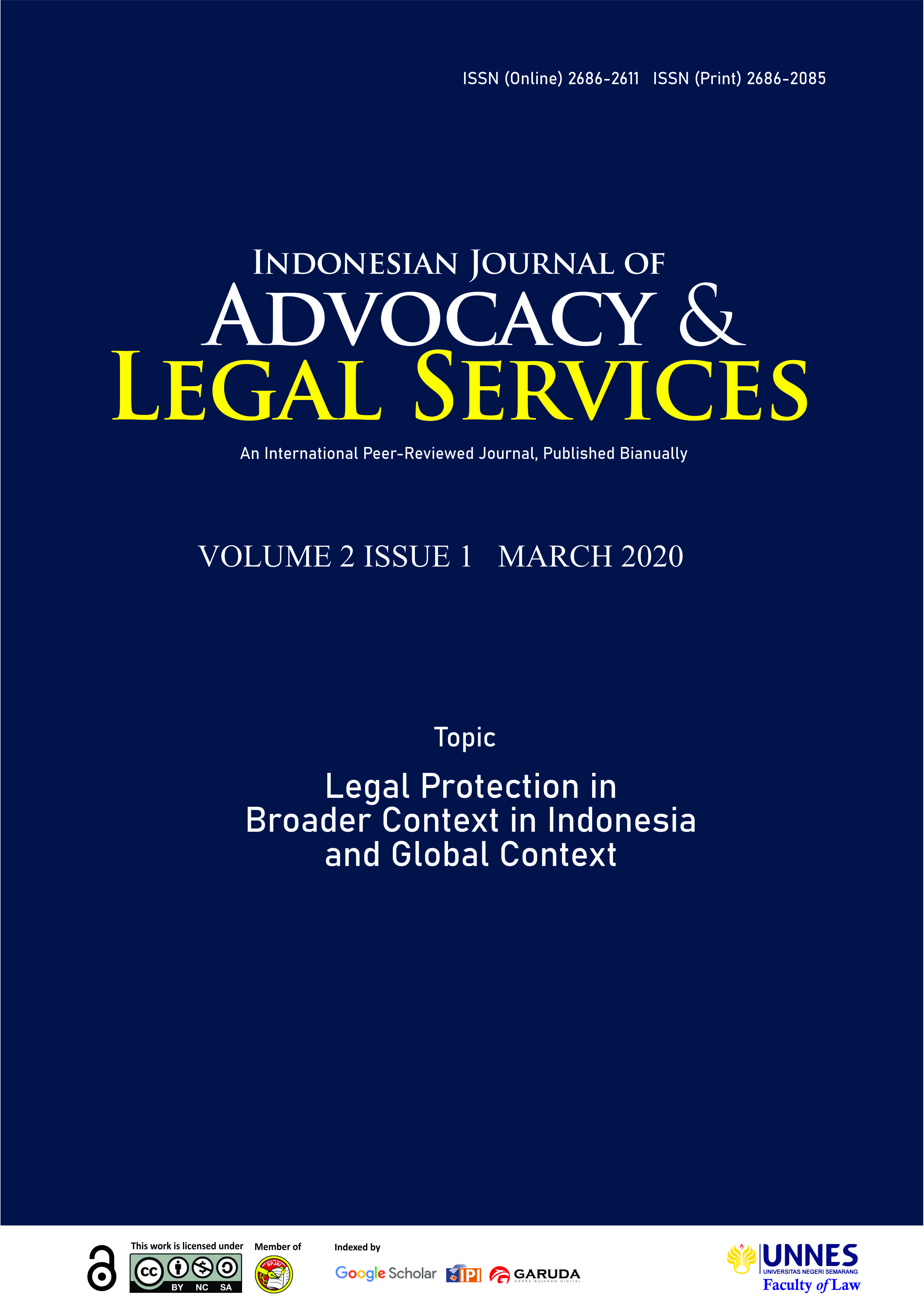The Application of e-Court as an Effort to Modernize the Justice Administration in Indonesia: Challenges & Problems
Main Article Content
Abstract
The Industrial Revolution 4.0 was an era marked by the carrying out of various technology-based human activities as a result of the transformation of life. This revolution has penetrated into various sectors of life, including the rule of justice. In order to face this revolution, the court is demanded to be able to provide legal services electronically through an application called e-Court. This application is an embodiment of The Electronic Justice System which has become a commitment of the Supreme Court of the Republic of Indonesia with the aim to synergize the role of information technology and procedural law. The presence of e-Court is expected to be able to overcome various problems in the Indonesian judicial process, such as the resolution of disputes that are running slowly, less responsive courts, and expensive judicial costs. Juridically, Law Number 48 of 2009 contains judicial principles. As stated in the law, cases submitted to the court must be resolved quickly, simply, and at a low cost. This means that the whole judicial process must be carried out with regard to effectiveness and efficiency in order to overcome obstacles in the justice administration. Thus, the presence of e-Court is expected to overcome various problems in the administration of justice with technology-based services. These services include online case registration, online case fee down payment, online party summons, and electronic trials. Therefore, this paper intends to describe the problems and challenges e-Court application in an effort to face the industrial revolution 4.0 in Indonesia.
Article Details
The Authors(s) retain copyrights of the Article published on Indonesian J. Advoc. Legal Serv. However, before publishing, it is required to obtain written confirmation from Author(s) in order to ensure the originality (Author Statement of Originality). The statement is to be signed by at least one of the authors who have obtained the assent of the co-author(s) where applicable. This work licensed under a Creative Commons Attribution-NonCommercial-ShareAlike 4.0 International (CC BY-NC-SA 4.0).
References
Ali Achmad, 2004, Sosiologi Hukum Kajian Empiris terhadap Pengadilan. Jakarta, STIH IBLAM Publishing.
Angga, A., & Arifin, R. (2019). Penerapan Bantuan Hukum Bagi Masyarakat Kurang Mampu di Indonesia. DIVERSI: Jurnal Hukum, 4(2), 218-236. https://doi.org/10.32503/diversi.v4i2.374
Arifin, R. (2020). Legal Services and Advocacy in the Industrial Revolution 4.0: Challenges and Problems in Indonesia. Indonesian Journal of Advocacy and Legal Services, 1(2), 159-162. https://doi.org/10.15294/ijals.v1i2.36488
Arifin, R. (2020). Legal Protection and Law Enforcement: The Unfinished Works. Indonesian Journal of Advocacy and Legal Services, 2(1), 1-4. https://doi.org/10.15294/ijals.v2i1.38035
Arifin, R. (2020). Legal Reform Discourse in Indonesia and Global Context: How Does The Law Respond to Crime. Journal of Law and Legal Reform, 1(2), 193-196. https://doi.org/10.15294/jllr.v1i2.37057
Atikah, I. (2018). Implementasi E-Court dan Dampaknya Terhadap Advokat Dalam Proses Penyelesaian Perkara di Indonesia. URL: http://osc.fhisip.ut.ac.id/
Basri, B., & Hendrawati, H. (2019). Pendidikan Hukum Indonesia Berorientasi Pada Nilai-Nilai Pancasila dalam Era Revolusi Industri 4.0. Pelita Bangsa Pelestari Pancasila, 14(1), 49-64. URL: https://pbpp.ejournal.unri.ac.id/index.php/JPB/article/view/7790
Diniyanto, A. (2020). Bureaucracy in Perspective of Government Administration Laws. Law Research Review Quarterly, 6(1), 85-90. https://doi.org/10.15294/lrrq.v6i1.36706
Djatmiko, H. (2019). Implementasi Peradilan Elektronik (e-Court) Pasca Diundangkannya PERMA Nomor 3 Tahun 2018 Tentang Administrasi Perkara di Pengadilan secara Elektronik. Legalita, 1(1), 22-32.
Hidayatno, A., Destyanto, A. R., & Hulu, C. A. (2019). Industry 4.0 technology implementation impact to industrial sustainable energy in Indonesia: A model conceptualization. Energy Procedia, 156, 227-233 https://doi.org/10.1016/j.egypro.2018.11.133
https://ptun-yogyakarta.go.id/index.php/artikel/193-e-court-dan-masa-depan-sistem-peradilan-modern-di-indonesia.html. [Accessed February 22, 2020].
Iqbal, M., Susanto, S., & Sutoro, M. Efektifitas Sistem Administrasi E-Court dalam Upaya Mendukung Proses Administrasi Cepat, Sederhana dan Biaya Ringan di Pengadilan. Jurnal Ilmu Hukum, 8(2), 302-315. http://dx.doi.org/10.30652/jih.v8i2.7286
Kurniati, I. A. (2019, March). Mengembalikan Citra Peradilan melalui E-Court. In Conference on Communication and News Media Studies (Vol. 1), 176-185. URL: http://proceeding.umn.ac.id/index.php/COMNEWS/article/view/1093
Manurung, E. H., & Heliany, I. (2019). Peran Hukum dan Tantangan Penegak Hukum Dalam Menghadapi Era Revolusi Industri 4.0. SOL JUSTISIO, 1(2 Oktober), 128-135. URL: http://ojs.mputantular.ac.id/index.php/sj/article/view/354
Meyrina, S. A. (2017). Perlindungan Hak Asasi Manusia bagi Masyarakat Miskin atas Penerapan Asas Peradilan Sederhana Cepat dan Biaya Ringan. Jurnal HAM, 8(1), 25-38. http://dx.doi.org/10.30641/ham.2017.8.25-38
Puhi, O., Akili, R. H., & Moonti, R. M. (2020). The Settlement of Abuse of Authority by Government Officials. The Indonesian Journal of International Clinical Legal Education, 2(1), 85-100. https://doi.org/10.15294/ijicle.v2i1.37323
Rahmatullah, I. (2017). Menerobos Sekat Administrasi Peradilan. Refleksi Hukum: Jurnal Ilmu Hukum, 1(2), 117-130. https://doi.org/10.24246/jrh.2017.v1.i2.p117-130
Rodin, R. (2013). Transisi Masyarakat Indonesia Menuju Masyarakat Informasi. Jurnal Palimpsest, 4(2), 2013-05. URL: http://journal.unair.ac.id/download-fullpapers-palim9b3452ac9bfull.pdf
Saman, W. S. W. M., & Haider, A. (2012). Electronic court records management: a case study (Doctoral dissertation, IBIMA-International Busines Information Management Association), 1-11. DOI: 10.5171/2012.925115
Santiadi, K. (2019). Expanding Access to Justice Through E-Court in Indonesia. Prophetic Law Review, 1(1), 75-89. https://doi.org/10.20885/PLR.vol1.iss1.art5
Sari, N. P. R. K. (2019). Eksistensi E-Court untuk Mewujudkan Asas Sedeerhana, Cepat, dan Biaya Ringan dalam Sistem Peradilan Perdata di Indonesia. Jurnal Yustitia, 13(1), 80-100. URL: http://www.ojs.unr.ac.id/index.php/yustitia/article/view/275
Septiar, R. R., & Harahap, S. (2019). Implementasi Pengadilan Elektronik (E-Court) Pada Badan Peradilan di Indonesia dihubungkan dengan Asas Sederhana Cepat dan Biaya Ringan. Prosiding Ilmu Hukum, 5(2), 902-907. URL: http://hdl.handle.net/123456789/20728
Setyowati, H., & Muchiningtias, N. (2018). Peran Advokat Dalam Memberikan Bantuan Hukum Kepada Masyarakat Dalam Perspektif Hak Asasi Manusia. Lex Scientia Law Review, 2(2), 155 - 168. https://doi.org/10.15294/lesrev.v2i2.27582
Singh, M., Sahu, G. P., Dwivedi, Y., Rana, N. P., & Tamilmani, K. (2018). Success Factors for e-Court Implementation at Allahabad High-Court. In PACIS (p. 137). URL: https://aisel.aisnet.org/pacis2018/137
Sudarsono, S. Konsep Peradilan secara Elektronik di Lingkungan Peradilan Tata Usaha Negara Pasca Diundangkannya Peraturan Mahkamah Agung Nomor 3 Tahun 2018. Tanjungpura Law Journal, 3(1), 42-65. http://dx.doi.org/10.26418/tlj.v3i1.34495
Waidner, M., & Kasper, M. (2016, March). Security in industrie 4.0-challenges and solutions for the fourth industrial revolution. In 2016 Design, Automation & Test in Europe Conference & Exhibition (DATE) (pp. 1303-1308). IEEE. URL: https://ieeexplore.ieee.org/abstract/document/7459511
